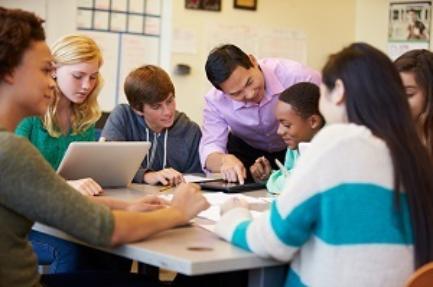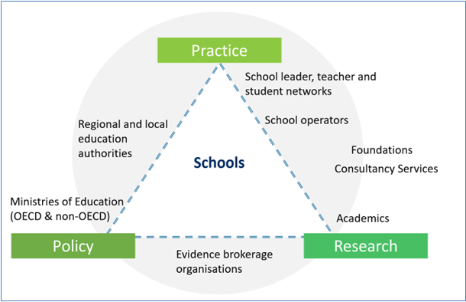Early childhood and schools
OECD Schools+ Network

What is the OECD Schools+ Network?Meeting the challenges of the 21st Century means that schools must be empowered to play a more central and active role in leading improvements in education. To support this, Schools+ will bring together major education networks to put schools at the centre of education design. Schools+ participants will unite around three core objectives:
|
What will Schools+ achieve?As a ‘network of networks’, Schools+ will bring together education experts, school leaders and teachers from across the globe to respond to common challenges and inspire advances in classrooms, schools and policies. During 2023 and 2024, Schools+ participating networks will join forces to examine new approaches to classroom practice and will:
|
Who are the participants?Participants in Schools+ consist of large education networks and organisations, including governments, teachers, teacher and school leader representative organisations, existing school networks, evidence brokerage organisations, and organisations supporting education development such as philanthropic foundations and international organisations. Participants include countries and organisations in both developed and developing economies, and are united by common interests, including:
|
|
|
| In addition to national governments and local education authorities, organisations participating in the network include:
Australia Education Research Organisation (AERO), Council of British International Schools (COBIS), Digital Promise Global, Education Endowment Foundation, Education International, European School Heads Association (ESHA), European Schoolnet, Eutopía, George Lucas Educational Foundation, Global School Leaders, GO@ scholengroep 20, HundrED, International Baccalaureate, International Confederation of Principals (ICP), Jacobs Foundation, Keller Education, LEGO Foundation, Magis Qualis, Networks of Inquiry and Indigenous Education (NOIIE) , Nord Anglia Education, Organising Bureau of European School Student Unions (OBESSU), Red de Escuelas Líderes, Results 4 Development (SALEX), Schools 2030, SUMMA, T4, Teach for All, UNESCO, Transcend Education, and the Varkey Foundation and VVOB - education for development. The work of Schools+ is being guided by an informal Advisory Group consisting of founding participants, notably the representatives of Education International, the International Confederation of Principals, the European School Heads Association, SUMMA, UNESCO, the Governments of France and Portugal and the Jacobs and LEGO Foundations. |
||
 |
Schools Learning CircleThe cornerstone of the work of Schools+ is the Schools Learning Circle, where some 150 schools from 40 countries are working together to build a Toolbox of Effective Classroom Practices. Together the schools are working with evidence on the 5 dimensions in the pedagogical taxonomy to understand what research says about effective teaching and learning, and how it can be applied in classrooms across the globe. The Toolbox is being developed around five key dimensions of teaching:
|
Generative AI in the ClassroomArtificial intelligence (AI) is now at the fingertips of every teacher and student. The Schools+ network has developed a new background paper on ‘Generative AI in the Classroom: Hype or reality?” which outlines what Generative AI (GenAI)is capable of doing and how it has evolved, provides a very initial assessment of the potential implications in and outside classrooms, and presents some pointers for teachers, school leaders and policy-makers from around the world to consider in unlocking the potential of GenAI while safeguarding against its potential pitfalls. The background paper was presented and discussed in the launch event of Schools+ Network and and will be further enriched with feedback and examples from schools across the globe. Did you miss the World Teachers Day webinar on the implications of Generative AI on the teaching profession?
|
Learn more about the official launchOn 22-23 May, we officially launched the OECD Schools+ Network with the hybrid event Schools as drivers of innovation, with representatives from some 40 countries and 25 organisations. During the interactive panel discussions, over 160 schools experts, leading thinkers and innovators came together to explore:
To learn more about the launch of the Schools+ Network:
|
Find out more
Schools+ Brochure of Participating Organisations Global Teaching InSights: A video study of teaching
|
Media Centre
|
For inquiries, interviews, and to learn more, contact: Anna PONS, Analyst and Project Manager +33 1 45 24 91 87 |
Related Documents
